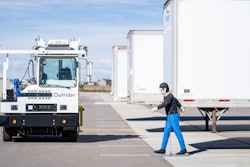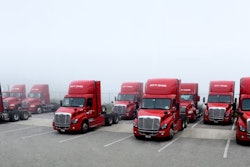When email widely replaced the fax machine, people sending faxes didn’t lose their jobs; their jobs changed. That’s what artificial intelligence is doing across industries, said Jonathan Salama, co-founder and CEO at AI-powered freight pricing platform Transfix.io.
“You won't be replaced by AI. You'll be replaced by people who understand and work with AI,” he said.
Employees across every industry, including trucking, are concerned that AI will take their jobs, but the consensus among AI experts is that AI won’t replace jobs but will instead make jobs easier and free up the time taken by repetitive manual tasks to spend performing higher quality work.
Toki Sherbakov, head of solutions architecture at OpenAI, likened it to “putting on your Iron Man suit,” saying that AI is a great accelerator, making employees much more impactful. Sherbakov said AI could help companies limit having to hire additional workforce, while Daniel Sokolovsky, co-founder and CEO of Warp, said AI can help companies “repurpose” labor.
The logistics platform in recent years has been adapting its employees’ roles to higher-level work as opposed to menial tasks.
Since automating the appointment booking process, employees that had previously managed that are now in customer service, and employees that were overseeing tracking updates are now managing relationships with carriers to improve their experience.
“What's happening is people are getting repurposed and put into more specialized things that are higher priorities for a business, rather than just picking up the phone and doing the same thing over and over again for a hundred times,” Sokolovsky said. “From the business management perspective, there are always … a lot of those nice-to-have pieces that would make your business more exceptional, but you just can't because the budget and the resources are being allocated to actually doing the work every day and making sure those appointments get booked.
“We've taken those resources away from the need-to-have things. What it has allowed us to do is work on the things that are nicer to have that are really making us stand out from the crowd,” he said, adding that it has allowed Warp to offer lower prices because it doesn’t have as many back-office expenses.
Pennsylvania-based trucking company Pitt Ohio recently implemented a no-touch-email system that uses AI to automate email-based order intake, eliminating the tedious task of copy and pasting bill of lading data from email into their transportation management system.
Pitt Ohio Executive Vice President and Chief Information Officer Scott Sullivan said the tool ensures that the carrier doesn’t miss out on freight. David Yunger, CEO of Vaital, which is the AI-driven strategy and engineering firm that Pitt Ohio worked with to develop the tool, said not one person at the carrier lost their job with the implementation of AI.
The company actually established a new role: director of AI, and other employees were given promotions, Yunger said.
“AI is not going to take your job, but someone else using it better might actually take your business if you're not careful,” he said. “So it's not a doomsday scenario (as if) we're going to cut a bunch of jobs. It should make us more productive. It should make our lives better.”
AI employees
There are a handful of areas where experts say jobs could be affected but not necessarily replaced by AI.
Salama said there are three main components in logistics where he thinks AI works best.
The first is pricing, which is where Transfix comes in. He said pricing has long been run by spreadsheets with individuals manually pricing loads on gut feeling or recent rates. He said the industry has gotten better in the past couple years about using data to inform those decisions but not applying AI for results.
[RELATED: Polaris Transport Group begins build on a quantum pricing engine]
“The roles in these logistics companies that are responsible for yield and price, does it mean that you're going to need less of them? Probably,” Salama said. “Are you going to reduce the team you currently have by using AI? I don't think so. But in the future, are you going to make sure you hire people that understand the AI in these roles. I think absolutely so.”
The second component, he said, is reading and extracting information from files, for example, incoming documents like lumper receipts or proofs of delivery sent to brokers by truckers.
“I think processing documents is going to be key, and this is an aspect where maybe this will replace jobs,” Salama said. “Hopefully, these people can do things that are more strategic and not just reading papers.”
And the third is bots that can speak on the phone, which he said can be helpful but could also be harmful to relationships.
Sokolovsky said logistics has been in an era of picking up the phone to confirm appointments or track shipments, etc., but those are things that now can be done by AI.
“Over the next couple of years, just the run-of-the-mill freight broker would all be done by AI,” he said. “I think there is still a place for people who deal with much higher complexity that AI currently isn't doing.”












